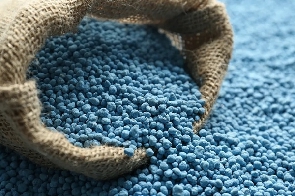Fertilizer Platform Ghana (FPG) has held discussions with Bryan Acheampong, Minister for Food and Agriculture, over an enhanced Planting for Food and Jobs (PFJ) for the year 2023.
The FPG, in a working visit to the Minister, led by Mr Ernest Osei-Assibey, Co-Chair for Public Sector and Richmond Dogbe, Co-Chair for Private Sector, discussed issues confronting the fertilizer sector in Ghana, including revision to PFJ implementation and reinstatement of fertilizer tax exemptions.
Mr Ernest Osei-Assibey, in his address, said, the FPG would review fertilizer products that had been introduced for the PFJ since 2018 to determine their suitability for achieving the programme’s targets.
He also recommended to the Minister to facilitate the ongoing initiatives of the fertilizer sector which include the development and revision of soil maps across the country.
“The soil amendment’s programmes in areas, particularly identified as acidic and incorporating such soil amendment products in government programmes that supplies fertilizers to farmers is paramount,” Mr Osei-Assibey said.
He also said there was the need to encourage more the composite application of inorganic and organic fertilizers to increase yields while maintaining quality.
Mr Bryan Acheampong, in his response, said the Programme had been revised, emphasizing that the ‘Enhanced PFJ’ had a new approach that would take the form of cooperative farming where inputs would be distributed through aggregators to nuclear farmers groups.
“The new model which has financial institutions, Ghana Commodity Exchange, Input dealers and farmers on one ‘Ghana Agricultural Platform’ will enable the repayment of input suppliers in a short time (4-6 months) for the supply of their inputs to support the programme,” he said.
The Minister said there had been a plan in place to pay off arrears owed input suppliers for the past two to three years, which had been one of the drawbacks of the existing programme.
Modalities of the programme would be that the market would be allowed to operate freely, farmers’ choice of fertilizer would be respected and supply made through an aggregator that would be selected and profiled by a technical team.
A bank guarantee system would be used and aggregators would be expected to off-take the produce and supply to the Buffer stock or Ghana Commodity exchange.
Business News of Sunday, 4 June 2023
Source: GNA













